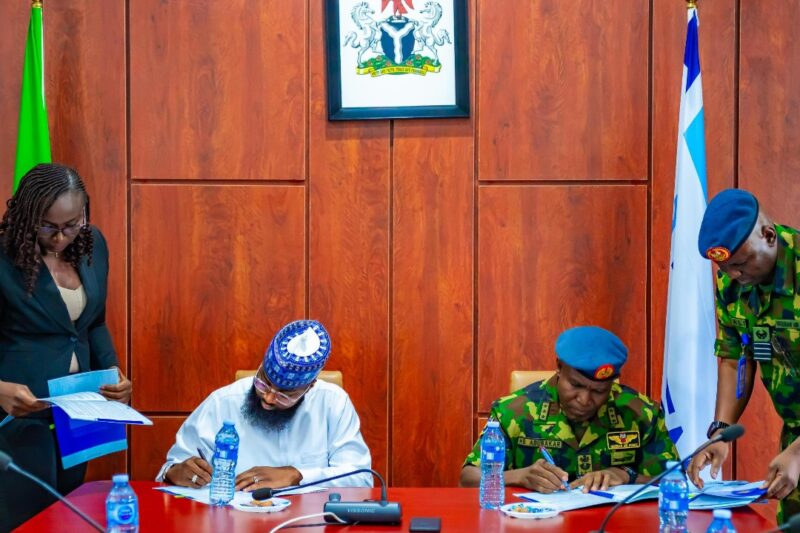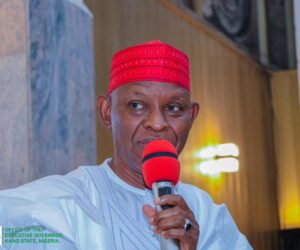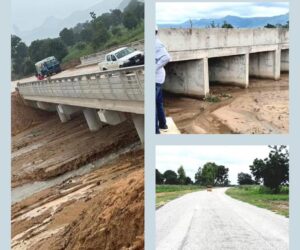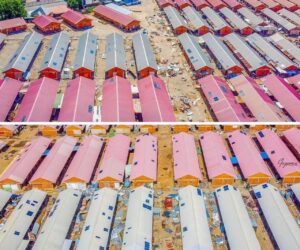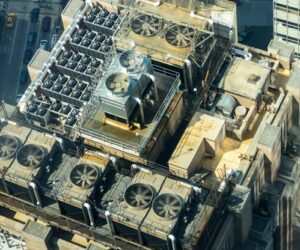In an effort to fast-track indigenous technological development and bolster national security, the National Agency for Science and Engineering Infrastructure (NASENI) and the Nigerian Air Force (NAF) have reaffirmed their strategic partnership by signing an updated Memorandum of Understanding (MoU), marking a new chapter in collaborative efforts to drive innovation in defence, aerospace, and engineering infrastructure.
The high-level engagement which took place at NASENI Headquarters, Idu Industrial Layout, Abuja, saw the Chief of Air Staff, Air Marshal Hasan Bala Abubakar lead a delegation of senior Air Force officers to the Agency. In his speech during the visit, the Air Marshal Abubakar lauded NASENI’s transformative strides under Mr. Halilu’s leadership.
He particularly noted the Agency’s contributions to the Nigerian defense ecosystem through reverse engineering, local manufacturing of critical components, and technical support to the Air Force. “We appreciate NASENI’s key role in the C5 Rocket Project, especially the production of rocket bodies, structural components, and the execution of precision material analysis. These are not minor feats,” he said.
SPONSOR AD
He described the partnership as strategic and necessary, calling attention to the establishment of the NASENI Northwest Technology Innovation Hub within the Air Force Institute of Technology (AFIT) in Kaduna, a landmark facility made possible through NAF’s land support.
Seeking a more integrated collaboration model, Air Marshal Abubakar proposed that NASENI and the Air Force become joint owners of the C5 Rocket Project, citing NAF’s status as both technical contributor and host to related infrastructure.
He also requested greater inclusion of Air Force personnel in the governance and implementation of the Kaduna-based hub and called on NASENI to enroll its young researchers in newly designed research and development (R&D) modules at the Air Force’s R&D Institute.
Additionally, the Air Marshal Abubakar extended an invitation to NASENI for deeper capacity building initiatives, including Computer Numerical Control (CNC) machining training for NAF’s technical staff at NASENI’s Centre of Excellence.
In his response, NASENI’s Executive Vice Chairman/CEO, Mr. Khalil Suleiman Halilu reaffirmed the Agency’s unwavering commitment to the alliance, describing it as “one of NASENI’s smoothest and most productive partnerships. We’ve achieved so much together” he said, adding that from “reverse-engineering critical components to co-establishing innovation hubs, we are just getting started.”
Mr. Halilu used the occasion to showcase NASENI’s ongoing projects, including development in Unmanned Aerial Vehicle (UAV) technology, drone pilot training, and the establishment of world-class CNC machining infrastructure. He emphasized the agency’s open-door policy for public institutions, encouraging the Air Force to take full advantage of NASENI’s facilities and expertise.
“While we work with the private sector to ensure efficiency and cost-effectiveness, our priority is national development. Our facilities are here for the Air Force and all other public agencies,” he said. He noted that the updated MoU signed during the visit is more structured and result-oriented, designed to align with President Bola Ahmed Tinubu’s Renewed Hope Agenda.
According to him, the focus is now on tangible outcomes in joint R&D, local manufacturing of aerospace and defense components, human capital development, and deepened knowledge exchange. “This partnership goes beyond paperwork,” Mr. Halilu stressed. “It’s about building the future of Nigeria’s defence and innovation ecosystem together.”
With both institutions aligned on vision and mission, the renewed partnership could be a game-changer for Nigeria’s defence industry, particularly at a time when global supply chains are strained and national security imperatives are more pressing than ever. This partnership will reduce dependence on foreign defence imports, and as well define the country’s technological future.
While the immediate impact of the renewed Memorandum of Understanding (MoU) between NASENI and the Nigerian Air Force (NAF) lies in defence and aerospace development, the real dividends of this alliance extend far beyond military technology.
The partnership is not just as a bilateral agreement but a national asset with the capacity to transform Nigeria’s economy, empower its youth, and strengthen its industrial base. One of the most immediate areas of potential value is in the development of local manufacturing capabilities.
NASENI’s commitment to reverse engineering and its advanced Computer Numerical Control (CNC) machining infrastructure means that many of the components previously imported can now be produced domestically. This not only reduces the country’s dependence on foreign suppliers but also positions Nigeria to become a hub for high-precision manufacturing within West Africa.
This collaboration with the Air Force is more than just about rockets and drones, it is about building the industrial capacity of Nigeria, training our young people in world-class skills, and producing the tools we need to solve Nigerian problems, by Nigerians for Nigerians.
It as well signifies and gives impetus to human capital development. The Air Marshal’s invitation for NASENI to enroll its young researchers in the Air Force’s new research and development (R&D) training modules, alongside proposals for CNC training for NAF technical personnel reflects a mutual understanding that skills development is the foundation for sustainable growth.
This aligns with President Bola Ahmed Tinubu’s Renewed Hope Agenda, which prioritizes youth employment and industrial productivity. NASENI–NAF partnership becomes particularly strategic, by expanding access to cutting-edge technologies and training, the agreement can empower a new generation of Nigerian engineers, technicians, and innovators.
Already, the NASENI Northwest Technology Innovation Hub in Kaduna built within the Air Force Institute of Technology (AFIT) — is providing a blueprint for how federal agencies can collaborate on youth-focused innovation. With adequate support, such hubs can serve as incubators for tech startups in robotics, renewable energy, materials engineering, and avionics.
Beyond education and innovation, the economic implications are substantial. If the vision behind the NASENI-NAF MoU is executed effectively, Nigeria could see the emergence of a thriving ecosystem of suppliers, fabricators, designers, and software developers all linked to the defence and aerospace value chain.
These activities would create thousands of skilled jobs, drive export revenues, and help Nigeria fulfill its obligations under the African Continental Free Trade Area (AfCFTA). It extends opportunities even further into national security and emergency response.
NASENI’s recent advances in Unmanned Aerial Vehicles (UAVs), when paired with NAF’s operational expertise, can enhance real-time surveillance, disaster response, and humanitarian operations. From flood mapping to search-and-rescue missions in remote regions, drones co-developed under the partnership can serve both civilian and military purposes.
Additionally, the C5 Rocket Project, already being co-developed by the two parties has potential dual-use value. Its development is not only vital for military readiness but can also aid in space-related exploration and atmospheric research.
If Nigeria can develop and control its own rocket propulsion systems, it opens the door to future investments in satellite launches, meteorological services, and possibly even regional space partnerships.
The NASENI-NAF agreement’s emphasis on shared infrastructure, knowledge exchange, and co-ownership of innovation projects also sets a strong precedent for inter-agency cooperation. By pooling technical expertise, funding, and facilities, public institutions can avoid duplication of efforts while maximizing national returns on investment.
In this vein, the partnership also promotes responsible public sector innovation, a model where government agencies collaborate transparently, share ownership of outcomes, and remain accountable to national goals. It could become a reference point for other federal institutions seeking to work together more effectively, particularly in sectors like education, energy, healthcare, and security.
More so, the growing synergy between NASENI and NAF aligns with Nigeria’s aspiration to become a regional leader in defence diplomacy and industrial self-sufficiency. With this partnership, Nigeria could soon be in a position to supply allied nations with non-lethal military equipment, cybersecurity tools, and UAV systems designed to meet Africa’s terrain and budget realities.
“The world is changing fast,” said Mr. Halilu. “And Nigeria cannot afford to be left behind. Our partnership with the Air Force is about charting a bold, indigenous path to development.” This broader vision also supports the country’s push to diversify its economy.
By investing in applied science, engineering, and technology, all within a coordinated framework where Nigeria can reduce its over-dependence on oil revenues. The NASENI–NAF MoU shows that innovation can be an anchor of growth, national pride, and resilience.
At its core, the NASENI-NAF strategic alliance is also about rebuilding national confidence. It signals to young Nigerians that the country values homegrown talent. It tells investors and researchers that Nigeria is ready to support science and engineering through political will, institutional backing, and long-term planning.

